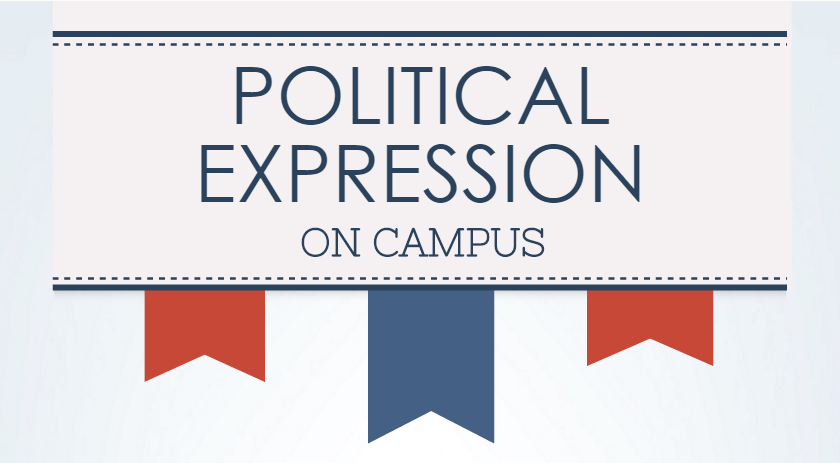Amid controversial political statements from presidential candidates this election season, conservative and liberal students say they feel pressured to suppress their opinions for fear of retaliation, with some feeling that Harvard-Westlake is not an open space to fully express opinions.
“I think people are worried that, if they don’t [self-censor], they will be attacked,” Harry Garvey ’18 said.
In an April 23 Chronicle poll of 372 students, 58 percent said that they have felt pressured to suppress their opinions when discussing politics at Harvard-Westlake. About 29 percent said they identify themselves more as Republicans, while 71 percent identify as Democrats.
Liberal students said that they are sometimes uncomfortable saying that they support Democratic candidate Sen. Bernie Sanders over Sen. Hillary Clinton because of the social pressures at Harvard-Westlake.
“I feel like [Sanders] would just be a better president for my safety, and that’s my opinion,” Chasia Jeffries ’17 said. “And people are like, ‘No, [Clinton] and stuff.’ And, I’m like, ‘Yeah, those are completely legitimate points. But for me, as a person, I feel like Bernie would be a better president at representing me.’ “
Students said conservative students feel the same pressure.
“Because [the election] is controversial, with Trump as the [leading] candidate of the Republican party, it is causing more issues,” Hannah Tuchman ’17 said. “Everybody at this campus is quick to condemn everything that Trump does so that if someone does support him, they will not come out and say it.”
Thirty-four percent said that they support Sanders, and 36 percent said that they support Clinton.

Also, 8 percent of the students said that they most strongly prefer Trump, 4 percent said that they support Republican presidential candidate Ted Cruz and 18 percent said that they support Republican presidential candidate Gov. John Kasich,
“I think there are some people who feel very strongly about who they would hypothetically vote for because they are too young to vote,” Jeffries said. “It’s uncomfortable when they are saying, ‘No. I’m going to vote for this person. How dare you want to vote for this other person?’ “
History teacher Francine Werner ’68 said she recognizes that students, especially conservatives, may feel uncomfortable speaking up about politics.
“Most times that it peaks, like during an election, you always have to be kind of careful about, I don’t want to say hiding views, but about keeping the atmosphere as open as possible,” Werner said. “This year, this particular year, it’s harder than ever.
“There might be people who do feel, I would not be surprised if there are people who are afraid, people who might like Trump or Cruz who might be nervous about speaking up,” she said. “I don’t think it is a lot of people, but I think it definitely might be. I think it is a real tough one this year.”
Other campuses have had to deal with controversy when students have expressed unpopular political opinions.
For example, at Emory University in March, some students anonymously posted chalk messages on sidewalks that read “Trump 2016,” leading other students to protest to administration.
Multiple news channels covered the issue, and Emory president Jim Wagner said students voiced “genuine concern and pain,” the Washington Post reported.
Some Harvard-Westlake students said that even though they do not support Trump, students have the right to express their views within reason.
“Freedom of speech applies to everyone in both parties unless it is violent and clearly is discrimination,” Tuchman said.
Still, judgement is inherent in these kinds of discussions about politics, and students should be prepared for that, Elliott Rollins ’16 said.
“I think that there is judgment no matter who you support,” Rollins said. “There is without a doubt large judgment for anyone who supports Trump. There is not as much with [Clinton] or [Sanders]. It is still there, but I’ve never seen anyone get in outright arguments over someone supporting Trump. I even saw a Facebook friend the other day literally ask people on Facebook why they support Trump. Not in a harsh way, but she was genuinely just curious.”
Only 23 percent of students said that they feel that there is not a lot of political discussion at Harvard-Westlake.
Upper school dean Sharon Cuseo feels that, although she is not completely sure that students feel pressured to suppress their political views on campus, there are not as many people expressing those views right now.
“I don’t have enough evidence to know if it is that they are not well informed, that they don’t have strong opinions or that they are uncomfortable voicing their opinions but I do notice that there is not a lot of discussion going on,” Cuseo said.
Cuseo also said that, although she has heard less political discussion recently, there is a decent amount of it among faculty members at Harvard-Westlake.
“Faculty always feel sort of more comfortable,” Cuseo said. “We know each other. We know kind of where they are coming from, and there can be more comfortable, healthy debate.”






































